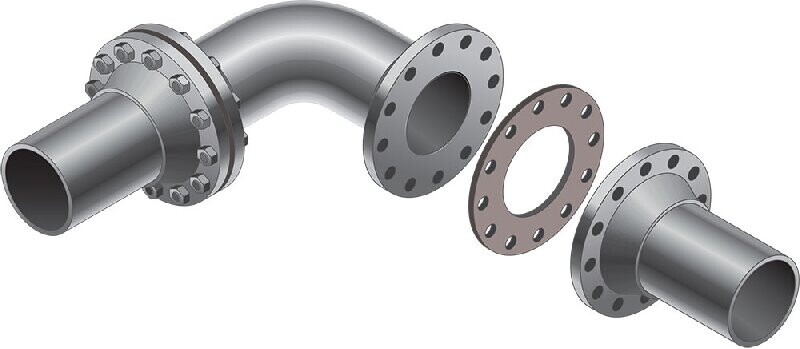Gasket Sealing: Mechanisms and Leak Prevention in Industry
Posted: 02/28/2024 03:23:49 Hits: 56
Sealing technology is crucial in industrial applications, especially for pressure vessels, process equipment, power machinery, and connecting pipelines. Gasket sealing is widely used in various industries. This article explores gasket sealing, its mechanism, leakage patterns, and leak mitigation strategies, aiming to enhance the safety and productivity of industrial installations.

Understanding the Mechanism of Gasket Sealing
Leakage, the undesirable flow of medium from a confined space to the exterior or vice versa, stems from gaps in contact surfaces, driven by pressure and concentration differentials. To mitigate leakage, maximizing the conformity of contact surfaces is crucial, reducing the cross-sectional area of leakage channels and bolstering resistance to surpass the driving force. Gaskets are employed precisely for their ability to undergo plastic deformation under compressive loads, effectively filling minute irregularities on flange sealing faces to achieve a secure seal. Within flange sealing joints, the compression of gaskets induces deformation, seamlessly filling microgaps between flange sealing surfaces.
Identifying Leakage Patterns in Gasket Sealing Connections
Gaskets serve as the linchpin sealing components in flange sealing joints. When non-metallic gaskets are tightened by bolts, they exert pressure on flange contact surfaces and within the gasket itself, filling minute gaps on flange surfaces and reducing leakage channels for the sealed fluid. However, given the inherent challenge of attaining perfectly smooth surfaces and the existence of tiny gaps or channels within sealing faces and gaskets, leakage remains an inevitable outcome.
Strategies for Mitigating Gasket Sealing Leaks
Effectively managing and mitigating gasket sealing leaks is crucial for ensuring the integrity and efficiency of industrial installations. Here are key strategies to address and reduce the risk of leaks in gasket sealing connections:
In conclusion, understanding gasket sealing mechanisms and leakage patterns is crucial for safe industrial operations. By optimizing tightening force, selecting suitable materials, and conducting routine inspections, leaks can be effectively mitigated, enhancing sealing performance and safety. Ongoing advancements in sealing technology are essential to meet evolving industrial demands and ensure sustainable development.

Understanding the Mechanism of Gasket Sealing
Leakage, the undesirable flow of medium from a confined space to the exterior or vice versa, stems from gaps in contact surfaces, driven by pressure and concentration differentials. To mitigate leakage, maximizing the conformity of contact surfaces is crucial, reducing the cross-sectional area of leakage channels and bolstering resistance to surpass the driving force. Gaskets are employed precisely for their ability to undergo plastic deformation under compressive loads, effectively filling minute irregularities on flange sealing faces to achieve a secure seal. Within flange sealing joints, the compression of gaskets induces deformation, seamlessly filling microgaps between flange sealing surfaces.
Identifying Leakage Patterns in Gasket Sealing Connections
Gaskets serve as the linchpin sealing components in flange sealing joints. When non-metallic gaskets are tightened by bolts, they exert pressure on flange contact surfaces and within the gasket itself, filling minute gaps on flange surfaces and reducing leakage channels for the sealed fluid. However, given the inherent challenge of attaining perfectly smooth surfaces and the existence of tiny gaps or channels within sealing faces and gaskets, leakage remains an inevitable outcome.
1. Interface Leakage: Insufficient tightening force, rough sealing surfaces on flanges, thermal deformation of pipelines, mechanical deformations, vibrations, and other factors can compromise the fit between gaskets and flange sealing surfaces, leading to interface leakage. Operating conditions such as temperature and pressure, bolt deformation and elongation, gasket creep relaxation, and aging can exacerbate this issue, termed "interface leakage."
2. Permeation Leakage: Non-metallic gaskets, typically composed of bonded plant, animal, or chemical fibers with rubber or porous materials like flexible graphite, are susceptible to permeation by the medium. Under pressure, this can result in leakage through the material, known as "permeation leakage," due to the loose structure and numerous tiny gaps between fibers.
2. Permeation Leakage: Non-metallic gaskets, typically composed of bonded plant, animal, or chemical fibers with rubber or porous materials like flexible graphite, are susceptible to permeation by the medium. Under pressure, this can result in leakage through the material, known as "permeation leakage," due to the loose structure and numerous tiny gaps between fibers.
Strategies for Mitigating Gasket Sealing Leaks
Effectively managing and mitigating gasket sealing leaks is crucial for ensuring the integrity and efficiency of industrial installations. Here are key strategies to address and reduce the risk of leaks in gasket sealing connections:
1. Optimizing Tightening Force: Increasing the tightening force of bolts appropriately enhances the pressure on the gasket, ensuring it adequately fills microgaps between flange sealing faces and reducing the risk of interface leakage.
2. Material Selection: Choosing gasket materials based on specific working conditions and medium characteristics improves their pressure and corrosion resistance, minimizing the occurrence of permeation leakage.
3. Routine Inspection and Replacement: Regularly inspecting flange sealing joints for proper fastening and promptly replacing aged or deteriorated gaskets ensures sustained sealing performance and operational safety.
2. Material Selection: Choosing gasket materials based on specific working conditions and medium characteristics improves their pressure and corrosion resistance, minimizing the occurrence of permeation leakage.
3. Routine Inspection and Replacement: Regularly inspecting flange sealing joints for proper fastening and promptly replacing aged or deteriorated gaskets ensures sustained sealing performance and operational safety.
In conclusion, understanding gasket sealing mechanisms and leakage patterns is crucial for safe industrial operations. By optimizing tightening force, selecting suitable materials, and conducting routine inspections, leaks can be effectively mitigated, enhancing sealing performance and safety. Ongoing advancements in sealing technology are essential to meet evolving industrial demands and ensure sustainable development.
Post URL: https://www.landeepipefitting.com/gasket-sealing-mechanisms-and-leak-prevention-in-industry.html
Landee is a professional industrial pipe fitting manufacturer and be well accepted by customers all over the world, we has been producing Pipe Fitting for a variety of applications since 1985. welcome to access our website: https://www.landeepipefitting.com.
Previous: The Role and Advantages of Reducing Tees in Piping Systems
Next: Metallic Spiral Wound Gaskets: A Versatile Sealing Solution
Next: Metallic Spiral Wound Gaskets: A Versatile Sealing Solution
